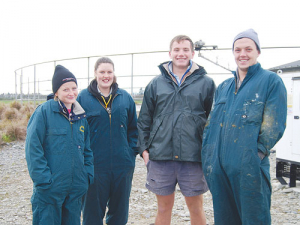Taratahi problems seen in 2018
The problems at Taratahi were laid open, prior to its interim liquidation in December, in August last year.
 Arthur Graves says young people coming into farming will need a good education, but traditional farm workers will always find roles.
Arthur Graves says young people coming into farming will need a good education, but traditional farm workers will always find roles.
Farmers in future will have to do both traditional farm work and have more high-end skills, says Taratahi Agriculture Training Centre chief executive Arthur Graves.
He says the future will bring more corporate-type farming operations, where employers will have to be much more skilled in human resources -- recruiting, retaining and getting full value from their staff.
And many young people coming into farming will need a good education, Graves says, though traditional farm workers will always find roles.
“That means Taratahi will have to service the current market, focusing on turning out good skilled workers, and develop our ability to keep up and get ahead of changes,” he told Rural News.
“It’s a two speed thing: we need to be thinking about young people, and about future employers, with high-end skills, management and leadership skills, systems thinking and problem solving skills and the ability to use data and sophisticated planning techniques.”
Graves sees the smartphone as not just a replacement for pen and paper, but also a means of enabling farmers to do more.
A challenge facing the wider agri-sector is where the next generation of farm workers will come from, he says. NZ is among the highly urbanised countries in the OECD and a way must be found to connect the values of farming with young people.
Historically farmers have been in agriculture for the lifestyle and their love of the work, “so how do you translate that into a modern paradigm for young people?” he asks.
“What is it that appeals to them? For example, could it be they value animals, looking after the environment or just value outdoor work? What pushes their buttons?”
Today’s young people don’t have the same access to agriculture as he and others of earlier generations had.
Though he wasn’t brought up on a farm, he lived in a small rural town and spent time with friends whose parents had farms.
Agrisea NZ has appointed Craig Hudson as it's new chief growth officer.
State farmer Landcorp, trading as Pamu, is a forecasting a full-year net profit of around $100 million.
Tony Aitken, chief executive of Ruralco, has been awarded the Excellence in Business Leadership Award at the ANZ Business of the Year Awards.
Global trade has been thrown into another bout of uncertainty following the overnight ruling by US Supreme Court, striking down President Donald Trump's decision to impose additional tariffs on trading partners.
Controls on the movement of fruit and vegetables in the Auckland suburb of Mt Roskill have been lifted.
Fonterra farmer shareholders and unit holders are in line for another payment in April.